 World Cup fever has taken firm hold across the planet, and as I sit and write from Norway, I can tell you that the situation here is no exception. Across every bar and restaurant, you can see country flags and miniature soccer balls hanging across verandas and entryways. World Cup 2018 is currently the greatest show on earth.
World Cup fever has taken firm hold across the planet, and as I sit and write from Norway, I can tell you that the situation here is no exception. Across every bar and restaurant, you can see country flags and miniature soccer balls hanging across verandas and entryways. World Cup 2018 is currently the greatest show on earth.
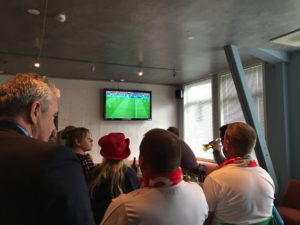 I just finished watching les Lions de Teranga defeat Poland while sitting amongst a crowd of Polish superfans (but by the time you read this, you will know that les Lions have been knocked out of the tournament). As I cheered when Senegal scored each goal, the Poles couldn’t understand why I was the only person not wearing their team’s colors of red and white. I’m not Senegalese, and I’m certainly not African. And to be honest—even if I could speak a word of Polish, there is no way I could have appropriately captured my love and support for Senegal in that moment.
I just finished watching les Lions de Teranga defeat Poland while sitting amongst a crowd of Polish superfans (but by the time you read this, you will know that les Lions have been knocked out of the tournament). As I cheered when Senegal scored each goal, the Poles couldn’t understand why I was the only person not wearing their team’s colors of red and white. I’m not Senegalese, and I’m certainly not African. And to be honest—even if I could speak a word of Polish, there is no way I could have appropriately captured my love and support for Senegal in that moment.
Now that this initial soccer match is in the books and Africa celebrates its first win at World Cup 2018, I’d like to try and explain my connection.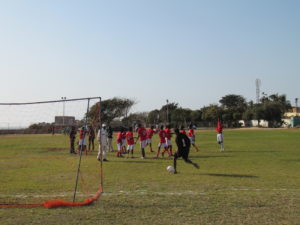 In a country that boasts a culture of impressive athleticism, soccer is game that runs through the blood of Senegalese people. You can’t travel far before coming across a group of adults or kids engaged in some sort of football action. And just like soccer, the Senegalese are also renowned for their deep rooted values of citizenship, family and solidarity. I speak not only about the men, but also of the women. But still, despite these virtues, there remain opportunities to grow stronger. Especially when we turn our focus on the women.
In a country that boasts a culture of impressive athleticism, soccer is game that runs through the blood of Senegalese people. You can’t travel far before coming across a group of adults or kids engaged in some sort of football action. And just like soccer, the Senegalese are also renowned for their deep rooted values of citizenship, family and solidarity. I speak not only about the men, but also of the women. But still, despite these virtues, there remain opportunities to grow stronger. Especially when we turn our focus on the women.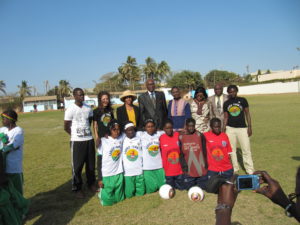 Ladies’ Turn is an initiative that I’ve supported since 2012. The organization fuses Senegal’s passion for soccer with local values in such a way that effectively promotes gender equality and women’s empowerment. I’m not talking about outsiders coming in pressing their belief systems on Senegal. But, much like what has been seen in the large-draw World Cup matches, soccer in Senegal is traditionally a man’s game. But this doesn’t that there are no girls playing the sport. Indeed there are plenty, and more importantly there are many more girls who are interested in trying but just haven’t been given the opportunity.
Ladies’ Turn is an initiative that I’ve supported since 2012. The organization fuses Senegal’s passion for soccer with local values in such a way that effectively promotes gender equality and women’s empowerment. I’m not talking about outsiders coming in pressing their belief systems on Senegal. But, much like what has been seen in the large-draw World Cup matches, soccer in Senegal is traditionally a man’s game. But this doesn’t that there are no girls playing the sport. Indeed there are plenty, and more importantly there are many more girls who are interested in trying but just haven’t been given the opportunity.
Regardless of what your beliefs may be about the state of the world, one can agree that sports present an opportunity to bring people of all backgrounds together. In these days with reports of so many places seeking to shut people out based their color, creed, or nationality, I believe that activities like these become even more critical. I’ve seen first-hand what Ladies’ Turn offers every day sur le terrain in West Africa, and how this grassroots work really matters. I believe in Ladies’ Turn, just as much as I believe in supporting Senegal’s national teams (both the men and women) regardless of whether they are playing in the World Cup.
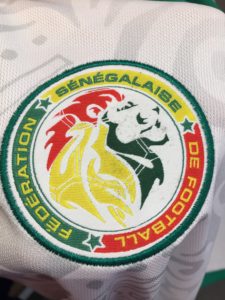 Senegal’s president, Macky Sall, has been an ardent supporter of his World Cup team by using the Wolof phrase dem ba jeex or “going to the end”. I love this sentiment, and as efforts like Ladies’ Turn grow in Senegal, I’d love to see this energy turned to the women who are out there playing as well. It is only through the support by both leadership and regular people that we can contribute positively to the self-confidence and personal development of future leaders. Young athletes and beyond.
Senegal’s president, Macky Sall, has been an ardent supporter of his World Cup team by using the Wolof phrase dem ba jeex or “going to the end”. I love this sentiment, and as efforts like Ladies’ Turn grow in Senegal, I’d love to see this energy turned to the women who are out there playing as well. It is only through the support by both leadership and regular people that we can contribute positively to the self-confidence and personal development of future leaders. Young athletes and beyond.
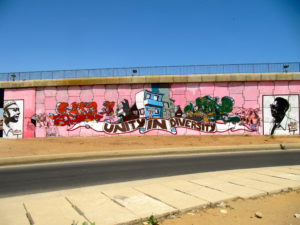 The New York Times runs a great section called “The Week In Good News“. A friend who also lived in Dakar has made a regular habit of texting me these links whenever we feel despondent about what has cropped up in the headlines while we were sleeping. I see Ladies’ Turn as providing the world with a bit of the same thing. If you’re interested in learning more or perhaps sharing its mission with others who are moved by what is currently going on, I’d ask you to take to 60 seconds and click here. You may find that once you get involved, you can really make an important impact by opening your aperture beyond simply following Russia 2018. And it’s an involvement that will leave you feeling better about our global community long after a team leaves Moscow with the FIFA trophy in hand.
The New York Times runs a great section called “The Week In Good News“. A friend who also lived in Dakar has made a regular habit of texting me these links whenever we feel despondent about what has cropped up in the headlines while we were sleeping. I see Ladies’ Turn as providing the world with a bit of the same thing. If you’re interested in learning more or perhaps sharing its mission with others who are moved by what is currently going on, I’d ask you to take to 60 seconds and click here. You may find that once you get involved, you can really make an important impact by opening your aperture beyond simply following Russia 2018. And it’s an involvement that will leave you feeling better about our global community long after a team leaves Moscow with the FIFA trophy in hand.